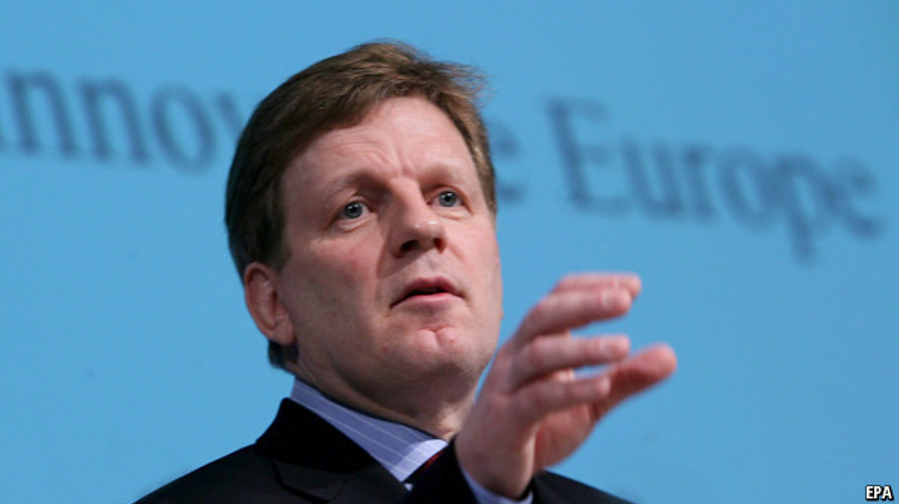
by Editor | Mar 7, 2020 | News
Former Presidents and PMs from Europe and North America will call for a social contract to govern Artificial Intelligence at Harvard and MIT during a three-day meet April 27-29.
When: April 27 (reception), April 28 and 29
Where: Harvard University and MIT, Cambridge Mass.
Who: World Leadership Alliance-Club de Madrid, an organization of former world leaders & The Boston Global Forum think tank, with Harvard and MIT Scholars
Featured Speakers:
Vint Cerf, widely regarded as the “Father of the Internet”
Joseph S. Nye Jr., University Distinguished Service Professor, Emeritus and former Dean of the Harvard’s Kennedy School of Government.
Moderator: Former Massachusetts Governor Michael Dukakis, cofounder of The Boston Global Forum and AIWS Innovation Network
Former Western leaders will meet in Cambridge to create a Social Contract for the Artificial Intelligence Age aimed at enhancing life, fostering equality, and preventing AI—machines that learn and think like humans—from creating a dystopian world of oppression, haves and have-nots and economic disruption.
Delegates will develop a Social Contract to harness Artificial Intelligence in ways that improve our lives without economic disruption and political upheaval.
During the sessions The Boston Global Forum’s AIWS Innovation Network will offer a new model for the AI economy aimed at creating new opportunities, fostering peace, and preserving human rights.

by Editor | Mar 7, 2020 | News
The rapid proliferation of applications of artificial intelligence and machine learning—or AI, for short—coupled with the potential for significant societal impact has spurred calls around the world for new regulation.
The European Union and China are developing their own rules, and the Organization for Economic Cooperation and Development has developed principles that enjoy the support of its members plus a handful of other countries. In January, the U.S. Office of Management and Budget (OMB) also issued its own draft guidance, ensuring the United States a seat at the table during this ongoing, multi-year, international conversation.
The U.S. guidance—covering “weak” or narrow AI applications of the kind we experience today—reflects a light-touch approach to regulation, consistent with a desire to reward U.S. ingenuity. Critics say the White House is embracing “permissionless innovation,” which involves the development and circulation of products or services without prior approval from regulators. Supporters have argued that the dynamic, boundary-pushing innovation principle is better than the restrictive precautionary principle.
The original article can be found here.
According to AI regulation, Michael Dukakis Institute for Leadership and Innovation (MDI) established the Artificial Intelligence World Society (AIWS) and AIWS Innovation Network for the purpose of promoting ethical norms and practices in the development and use of AI. AIWS will identify, publish and promote principles for the virtuous application of AI, and AIWS-IN will develop apps consistent with these principles for use in healthcare, education, transportation, national security, and other areas.

by Editor | Mar 7, 2020 | News
Proscia, a leading provider of artificial intelligence (AI) enabled digital pathology solutions, and the University of California, San Francisco (UCSF) have partnered to introduce artificial intelligence into the practice of pathology. Beginning with prostate cancer, the second leading cause of cancer deaths among men in the U.S., the collaboration will validate the clinical efficacy of computational pathology applications for several high-impact pathology subspecialties.
The standard of care for diagnosing cancer relies on the pathologist’s assessment of tissue biopsies viewed under a microscope. This 150-year-old manual and subjective practice cannot keep pace with the rising cancer burden amid a decreasing pathologist workforce. Prostate cancer diagnosis is especially problematic given its high slide-per-case volume, complex reporting requirements, and qualitative grading system, often leading to delayed turnaround times, increased use of ancillary tests, and reduced confidence in treatment decisions.
Proscia and UCSF are collaborating on the validation of computational pathology applications that drive much-needed quality and efficiency gains for clinical laboratories using digital pathology. As one of the earliest adopters of digital pathology for primary diagnosis, UCSF has amassed volumes of diverse, high-quality digitized data. This data is initially being used to ensure that Proscia’s computational pathology application for prostate cancer accurately accounts for the variability that exists across a wide range of diagnoses, methods of biopsy and tissue preparation, tissue staining procedures, and digital scanning processes.
The original article can be found here.
To support and collaborate AI application and Society, Artificial Intelligence World Society Innovation Network (AIWS-IN) created AIWS Young Leaders program including Young Leaders and Experts from Australia, Austria, Belgium, Britain, Canada, Denmark, Estonia, France, Finland, Germany, Greece, India, Italy, Japan, Latvia, Netherlands, New Zealand, Norway, Poland, Portugal, Russia, Spain, Sweden, Switzerland, United States, and Vietnam.
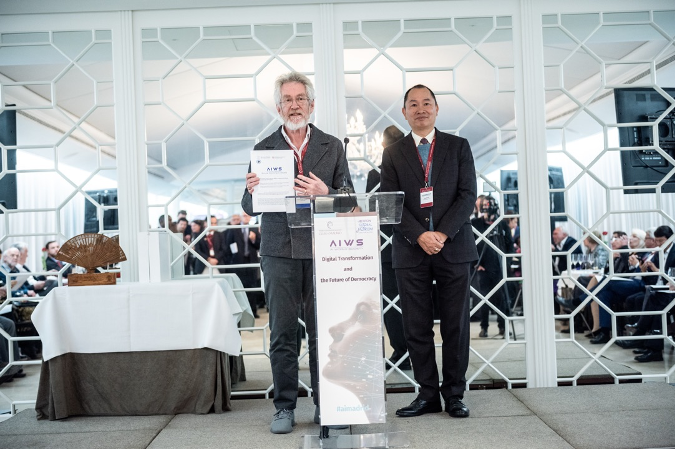
by Editor | Mar 1, 2020 | Global Alliance for Digital Governance, Global Law and Accord on AI and Digital, News
The World Leadership Alliance – Club de Madrid (WLA-CdM) in partnership with the Boston Global Forum (BGF) is organizing a Transatlantic and multi-stakeholder dialogue on global challenges and policy solutions in the context of the need to create a new social contract on digital technologies and Artificial Intelligence (AI). By comparing American and European approaches in the creation of a new social contract on AI and digital governance, under the critical eye of former democratic Heads of State or Government, this policy dialogue will stimulate new thinking and bring out ideas from representatives of governments, academic institutions and think tanks, tech companies, and civil society, from both regions. At the same time, the discussion will generate a space to encourage and strengthen Transatlantic cooperation on the new social contract of digital governance in the framework of needed reforms of the multilateral system and will serve as a platform to establish a Transatlantic Alliance for Digital Governance. Besides, the policy discussion aims to discuss the creation of an initiative to monitor governments as well as companies in using AI and generate an AI Ethics Index at all levels.
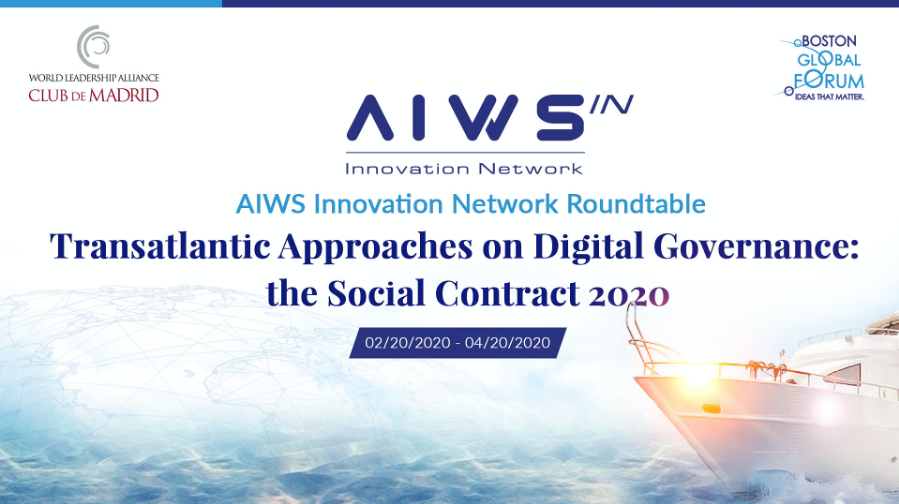
by Editor | Mar 1, 2020 | News
The EU wants to become a global leader for AI governance. “There is, however, a gap between Europe’s lofty ambitions and its actual institutional capacity for research, analysis and policy development to define and shape the European way on AI guided by societal values and the public interest. Currently the debate is mostly driven by industry, where most resources and capacity for technical research sit. Compared to industry and business consultancies, European civil society organizations struggle to have as strong an impact on the policy debate. In the US in contrast, there are numerous innovative and highly visible initiatives and research programs that seek to study and address the social, political and ethical challenges of AI in the US. The lack of involvement of civil society poses a serious problem for the EU’s regulatory ambition: Any claims of the EU Commission regarding human-centric and trustworthy AI would be for nought if the concept and underlying regulatory agenda are developed for but not with civil society.” This is the opinion from the report by Stiftung Neue Verantwortung (SNV).
To solve this gap, The Boston Global Forum, World Leadership Alliance-Club de Madrid, and MIT Connection Science will establish The Transatlantic Alliance for Digital Governance. These three institutions will be the residence of the Alliance. The leaders of the Boston Global Forum are Governor Michael Dukakis, Chair, and Mr. Nguyen Anh Tuan, CEO; the leaders of World Leadership Alliance-Club de Madrid are President Danilo Turk and Maria-Elena Aguero, Secretary General; and the leader of MIT Connection Science is Professor Alex Pentland.
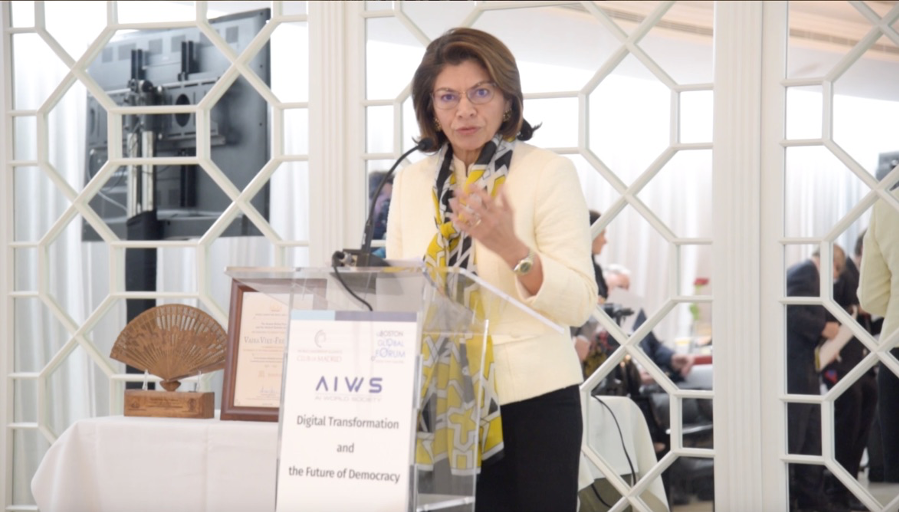
by Editor | Mar 1, 2020 | AI-Government, News
With WHITE PAPER “On Artificial Intelligence – A European approach to excellence and trust”, the EU have an ambition to become a global leader for AI governance. This is needed in the context of the world today. However, the EU lack civil societies to join and support this program. To solve this gap between EU’s ambition and capacity, Boston Global Forum and World Leadership Alliance Club de Madrid co-organize the conference “Transatlantic Approaches on Digital Governance: A New Social Contract in Artificial Intelligence” at Harvard University and MIT from April 27 to 29, 2020.
We are pleasured to introduce the report “Towards a European AI & Society Ecosystem” by Stiftung Neue Verantwortung (SNV).
Governing AI is crucial to ensure that its development and deployment are aligned with our (European) values and societal interests. While many look to Silicon Valley or increasingly to China to catch the latest trends and technological advances, all eyes are on the European Union concerning the question of where global leadership on AI governance will appear.
The United States is widely seen as the global leader in AI – both in terms of academic output and commercial applications. There are also strong NGOs and interdisciplinary research programs that study potential harms and social risks associated with the technology. However, given the political tides in Washington D.C. and the policy priorities of the Trump administration, the United States is currently unable and unwilling to shape global norms and regulate AI. China aspires to global leadership in AI but its use of AI for social control, surveillance and censorship clash with democratic principles. Simply copying and pasting one of these models into the European context would be incompatible with European culture, values, laws and social contexts. This makes Europe currently the only region where a regulatory agenda on AI rooted in democratic values can be established and – given the size of the EU’s internal market – and have a reasonable potential for global impact. Europe has generally embraced the role as a global regulator of technology. For many EU policy makers, the GDPR serves as a model, demonstrating the EU’s ability to set global standards in the tech sector.

by Editor | Mar 1, 2020 | News
“What’s the problem you’re trying to solve?” Clayton Christensen, the late Harvard business professor, was famous for posing this aphoristic question to aspiring entrepreneurs.
By asking it, he was teaching those in earshot an important lesson: Innovation, alone, isn’t the end goal. To succeed, ideas and products must address fundamental human problems.
This is especially true in healthcare, where artificial intelligence is fueling the hopes of an industry desperate for better solutions.
But here’s the problem: Tech companies too often set out to create AI innovations they can sell, rather than trying to understand the problems doctors and patients need solved. At many traditional med-tech conferences and trade shows, for example, talks and sales pitches focus squarely on the technology while routinely overlooking the human fears and frustrations that AI can address.
Because of this failure to prioritize human needs above business interests, medicine’s most-hyped AI applications have, repeatedly, failed to move the needle on public health, patient safety or healthcare costs.
“Addressing the challenges and opportunities around how technology affects our community is hugely important,” said Hugh Forrest, Chief Programming Officer at South by Southwest (SXSW) conference. “From privacy to blockchain to AI to MedTech, using this lens to filter how we look at a lot of issues facing modern society allows us to connect the dots in a deeper way. Especially in the case of an area like AI, where there’s quite a bit of uncertainty and fear, we also want to showcase how these innovations can be ethical and improve lives.”
The original article can be found here.
According to AI application in the society and healthcare, AI World Society has established AIWS Innovation Network will connect key AI actors and provide services that

by Editor | Mar 1, 2020 | News
Artificial intelligence and machine learning have the potential to boost many, many areas of the enterprise. As explored in my recent post, it is capable of accelerating and adding intelligence to supply chain management, human resources, sales, marketing and finance. Oh, and one more area, by the way — IT management.
The inevitable impact of AI on IT departments was touched on in a recent survey of 2,280 business leaders from MIT Sloan Management Review and SAS, which finds that in these early days of AI, IT professionals will be feeling the greatest impact — both from a career and an operational point of view..
CIOs, chief data officers, and chief analytics officers will be on the front lines of AI implementations, the study finds. IT road maps, software development, deployment processes, and data environments are likely to be transformed in the near future.
Most IT managers report that they are still developing foundational capabilities for AI — cloud or data center infrastructure, cybersecurity, data management, development processes and workflow.
The original article can be found here.
To support and collaborate AI application and IT operation, Artificial Intelligence World Society Innovation Network (AIWS-IN) created AIWS Young Leaders program including Young Leaders and Experts from Australia, Austria, Belgium, Britain, Canada, Denmark, Estonia, France, Finland, Germany, Greece, India, Italy, Japan, Latvia, Netherlands, New Zealand, Norway, Poland, Portugal, Russia, Spain, Sweden, Switzerland, United States, and Vietnam.
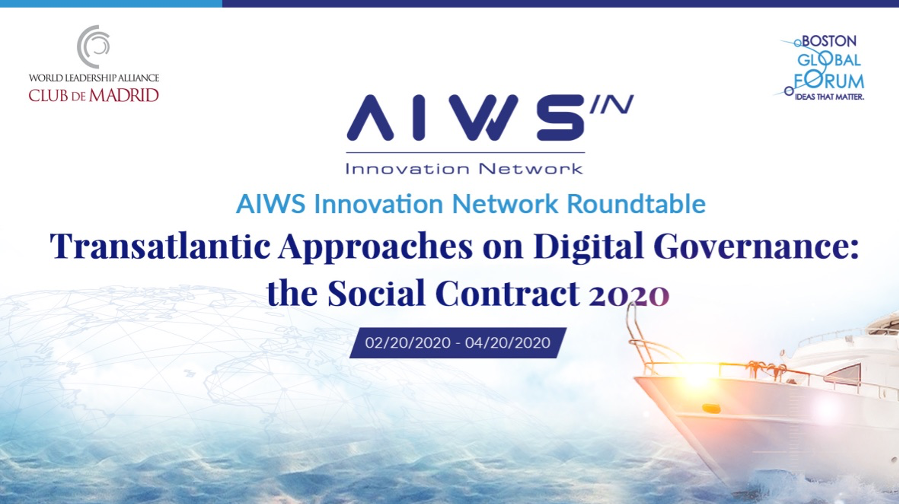
by Editor | Feb 24, 2020 | News, AIWS and the Age of Global Enlightenment
President of World Leadership Alliance-Club de Madrid, former president of Slovenia, Danilo Turk, will discuss in AIWS Innovation Network (AIWS-IN) Roundtable, a part of Policy Dialog “Transatlantic Approaches on Digital Governance: A New Social Contract in Artificial Intelligence”.
Professor Joseph Nye, the father of Soft Power, Professor Stephen Walt, Professor Thomas Patterson, Harvard University, Professor Nazli Choucri, MIT, father of Internet Vint Cerf, will discuss with President Danilo Turk and world leaders. There are several distinguished thinkers, inventers, innovators, and world leaders will discuss on questions:
- Balance the five centers of power: Government, Business, People, Civil Society, AI Assistants?
- Build and implement Global Data and AI Regulations?
- Establish a new balance of power among nations?
- Transform the world economy into one with opportunities for all people?
The AIWS-IN Roundtable, an online discussion, with the platform AIWS Innovation Network, has started from 02/20/2020, and will finish on 04/20/2020. The Boston Global Forum will collect ideas from this roundtable for the AIWS Social Contract 2020.








